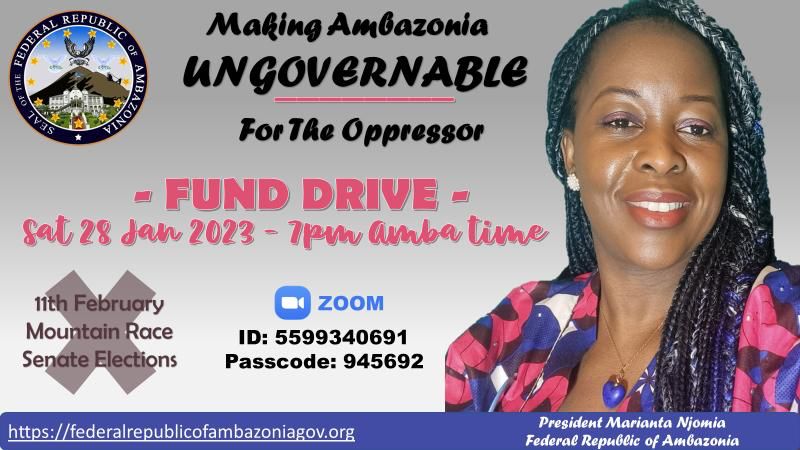Renowned La République du Cameroun law academic and politician Maurice Kamto has wadded into the Ambazonian Liberation Struggle with a social media post in which he reheats the “wrong federalist” argument that “massive voter registration” in La République du Cameroun’s presidential election will “allow” Ambazonians, who he calls “anglophones”, to “exercise their self-determination by voting” in that “election”. In a previous post, Ambazonia News discussed the similarly blue-sky ideas of certain naïve federalists in suggesting that opinion polling could cause change “within” La République du Cameroun, which could facilitate the return of a federation by demonstrating the people’s preference.
On the face of it, Prof. Kamto’s post sounds “reasonable” and if we are wondering why it even needs to be made as an “offer”, then that is the paradox and where the offer damns itself, for it implies that “democracy” is a special offer in La République du Cameroun! To his credit, Prof Kamto, is ,therefore, acknowledging our [Ambazonian] experience of the lack of democracy in La République du Cameroun, where we do not even legally belong, and, therefore do not have to endure the abuses of what Prof. Kamto calls a “brutal, autocratic, kleptocratic” regime which has “mishandled the reunification”.
Prof. Kamto himself has spent the current “grand projects term” protesting a stolen vote in the last La République du Cameroun presidential election of 2018, so even if Ambazonians were gullible enough to fall for his “offer”, there would be no precedent to base any faith on, that their votes would “count”, or what would accrue if those votes did somehow count. There is no “consensual electoral system” in La République du Cameroun, even for their own citizens as Prof. Kamto himself has often lamented, so Ambazonians would have to be gullible indeed to suppose that they could achieve any self-determination through a La République du Cameroun-organised vote, already disowned by their own citizens, including principally the gentleman advocating such a folly! Prof. Kamto would appear to be asking Ambazonians to replay the mistakes of the past by diving head-first into an ill-defined “association” merely in the “hope that it will turn out alright as we are brothers”! Ambazonians, you have learnt from those mistakes at high and continuing cost. Do you want La République du Cameroun militia firing into school-bound traffic, or even controlling such traffic? In what country on the planet would such victims spurn the opportunity to break free from such a fix?
But that is not all. There are more fundamental legal issues at play to do with the Bamenda High Court ruling, HCB 28/92, a fact which makes Prof. Kamto’s apparent offer more threatening, compounded by his renown as lawyer. HCB 28/92 ruled that La République du Cameroun is/was “forcefully and illegally occupying Southern Cameroons, unless La République du Cameroun showed just cause”. La République du Cameroun has never addressed, appealed or tackled the ruling in any way other than through “force”, even before the recent seven year period of heightened genocidal acts in Southern Cameroons by her militias.
HCB 28/92 says, in so many words, that La République du Cameroun and Ambazonia are separate nations on the basis of La République du Cameroun having had her international borders set in 1960, and reaffirmed same in 1984, thereby releasing Southern Cameroons from the unratified process of a “federation of equal states” engaged in 1961. As long as La République du Cameroun is called La République du Cameroun, it has those borders and zero right to any Ambazonian territory -economic, social or political. In fact, better still, it does not matter if La République du Cameroun changes her name, for it is now like we are in the plebiscite campaign period when decisions could not be made for either La République du Cameroun or Southern Cameroons except by those separate peoples themselves, separately.
La République du Cameroun citizens were not allowed to vote in the plebiscite and they are not allowed to vote today in Ambazonia or offer Ambazonians a vote in La République du Cameroun! Ambazonia regained the right to her own destiny in 1984 and her citizens do not need to be offered any thing in La République du Cameroun’s political system. What’s more, the value of such an “offer” to take take part in an illegal election under an electoral system, he himself rejects, and when Ambazonia has a righteous legal and moral cause is frankly disingenuous and nebulous.
The real danger and loss if any Ambazonians fall for this wooden horse would be that they provide the fig-leaf/thread of “representation” by which La République du Cameroun’s forceful occupation hangs over Ambazonia. Is it possible Prof. Kamto can make this “offer” not because he expects to win the La République du Cameroun election but because he is one of the La République du Cameroun class of “gouvernants” who want to continue pillaging Southern Cameroons and their own country on behalf of a foreign manipulative colonial power?
Ambazonians beware! It is not your vote that they want! They just want to be able to say you are represented in their system so that they can continue to exploit you as they have always done. Reject this “offer” and La République du Cameroun will have to leave so that you can run your own country and benefit from your own efforts and hard work. It is not even a realistic offer as it is illegal under international law for La République du Cameroun to try to organise their elections on Ambazonian territory.
Please recall that there is a Presidential Executive Order reminding Ambazonians of their freedom to shun La République du Cameroun’s make-believe.
See also, why the federalists are wrong and the Bamenda High Court Ruling
The Most High God is the Watchman of Ambazonia.



